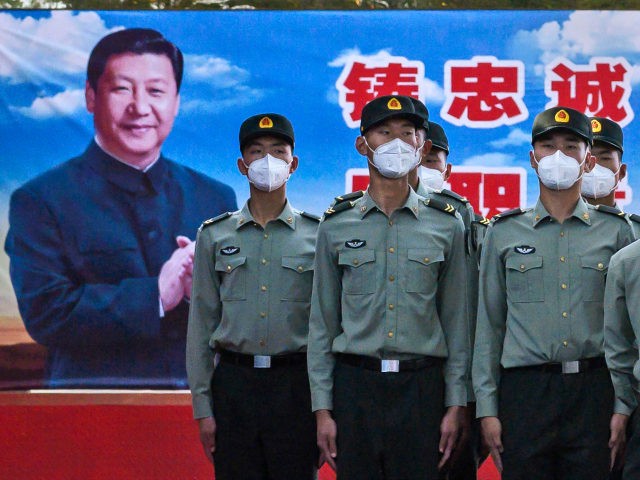The Chinese Communist Party announced through its official media outlets on Sunday that the National People’s Congress (NPC) recently amended the country’s “National Defense Law” to better promote Beijing’s “anti-war and peace-loving beliefs” internationally.
The Global Times, China’s most belligerent English language state newspaper, proclaimed without following the legal move that it would help the Chinese military “make itself heard more on global justice,” without elaborating.
China’s CGTN broadcaster did not specify the text of the new law but noted it would take effect on Friday and that the world should rejoice that it emboldens China’s “national defense.”
“According to an official working for the legislative bureau under China’s Central Military Commission (CMC), the newly revised defense bill explicitly states that China follows a defensive national defense policy,” CGTN claimed, “and will actively promote international military communication and cooperation, showing its anti-war and peace-loving beliefs.”
The NPC rewrote the law on Saturday but Beijing announced the changes the next day.
Among the amendments to the already existing National Security Law are policies meant to encourage civilians to invest in the military and military technology, the outlet claimed.
“The revision to the National Defense Law stipulates that the country encourages and supports eligible citizens and enterprises to make investments in the national defense sector, guarantees their legitimate rights and interests, and provides them with preferential policies according to the law,” CGTN said, citing the unnamed official.
The law also reportedly helps normal citizens “improve […] their national defense skills,” a provision that Chinese media did not elaborate on.
While CGTN emphasized the impact that the amendments to the National Defense Law would have on Chinese citizens, the Global Times cited its usual Communist Party-approved experts to make the case that this would allow the People’s Liberation Army (PLA) greater latitude to meddle in international affairs.
“After the approval of China’s new amendment to the country’s national defense law, China is expected to make itself heard more on global justice in addition to its own,” the Global Times predicted, “and will play a unique role in safeguarding world peace at a time when evil forces are ravaging it, Chinese experts said on Sunday.”
The text of the law, the state propaganda newspaper reported, “opposes acts of invasion and expansionism,” presumably language targeted at the United States. The Chinese communist regime has branded routine American military activities like Freedom of Navigation Operations (FONOPs) in the South China Sea “expansionism.” In reality, China has claimed territory in that sea that belongs to five nations – Taiwan, Vietnam, Malaysia, Brunei, and the Philippines – building military bases on artificial islands and destroying the local ecology. American FONOPs are meant to deter this expansionist behavior.
“The new amendment puts stress on embodying the sense of justice of China’s national defense, which indicates that China will make itself heard in terms of global justice, particularly in opposing acts of invasion and expansion by regional and global hegemonies,” the Global Times asserted, citing a “Chinese military expert.”
Like the CGTN report, the Times also noted that the amended law would require civilians to be more deeply involved in “national defense,” a vaguely defined term.
“All national organizations, armed forces, political parties, civil groups, enterprises, social organizations and other organizations should support and take part in the development of national defense,” the law reportedly demands. Civilians will now be expected to “fulfill national defense duties and carry out national defense missions.”
China has endeavored to expand its global military footprint under dictator Xi Jinping. Its most prominent new military project is the ongoing construction of a permanent military base in Djibouti, an African nation with close proximity to the Arabian Peninsula. As part of its Belt and Road Initiative (BRI) – a plan for China to take over control of the world’s most important transportation infrastructure – China has expanded greatly into Africa, offering loans with onerous interest rates to impoverished nations to build train lines and ports.
The amendment followed extensive condemnation in Chinese propaganda outlets of the American Chinese coronavirus relief bill, signed into law with an attachment that explicitly condemned China’s occupation of Tibet. Beijing views Tibet as a province and has asserted control over Tibetan language and religion, under the auspices of the atheist Communist Party. China has regularly campaigned for decades against the legitimate leader of Tibetan Buddhism, the Dalai Lama, referring to him at one point as an “Islamic State sympathizer.”
The American law – including the text of a prior bill, the Tibetan Policy and Support Act – specifically condemned China for abducting and disappearing a six-year-old boy the Dalai Lama declared the Panchen Lama, the second-highest authority in the religion, and replacing him with a Party-approved imposter. It also rejected any future Dalai Lama appointed by the Communist Party and demanded that Beijing allow the United States to establish a consulate in Lhasa, the regional capital of Tibet.
“China firmly opposes the U.S. Act on Tibet that you asked about,” Chinese Foreign Ministry spokesman Zhao Lijian told a Kyodo News reporter on Monday. “Tibet-related issues, as part of China’s internal affairs, bear on China’s sovereignty and territorial integrity and allow no interference by any external forces. The Chinese government is determined to safeguard its sovereignty, security and development interests.”
Zhao insisted, “Reincarnation of living Buddhas including the Dalai Lama must comply with Chinese laws and regulations and follow religious rituals and historical conventions.”

COMMENTS
Please let us know if you're having issues with commenting.